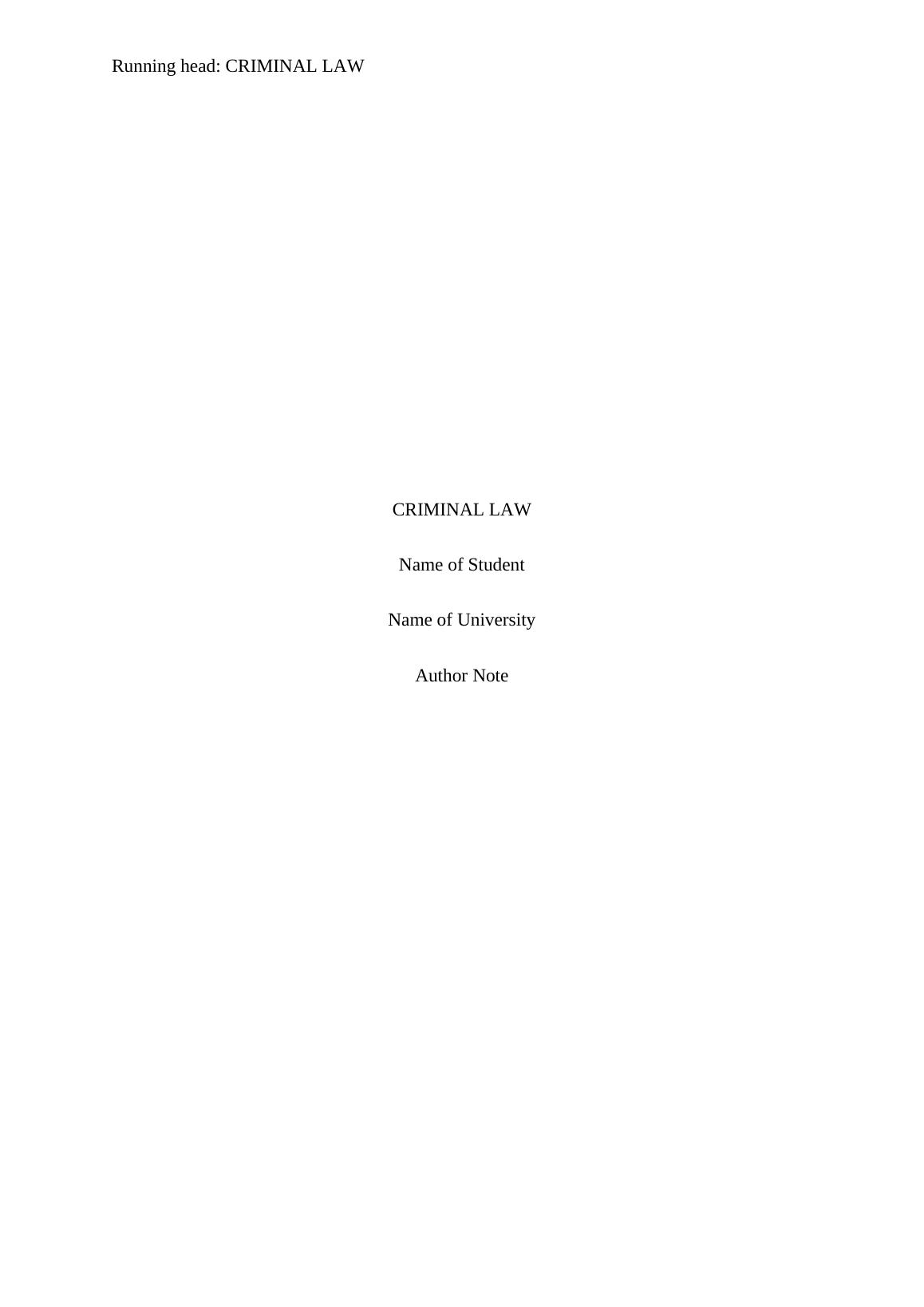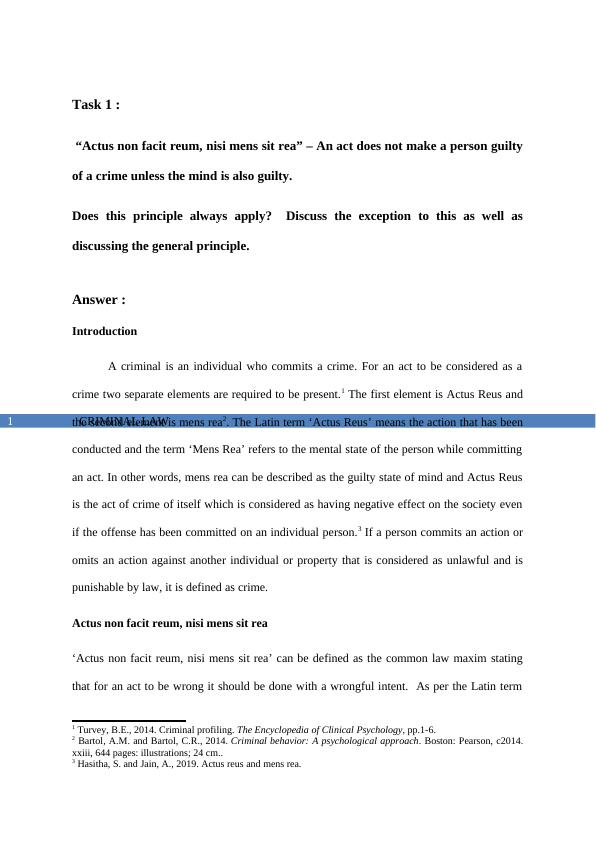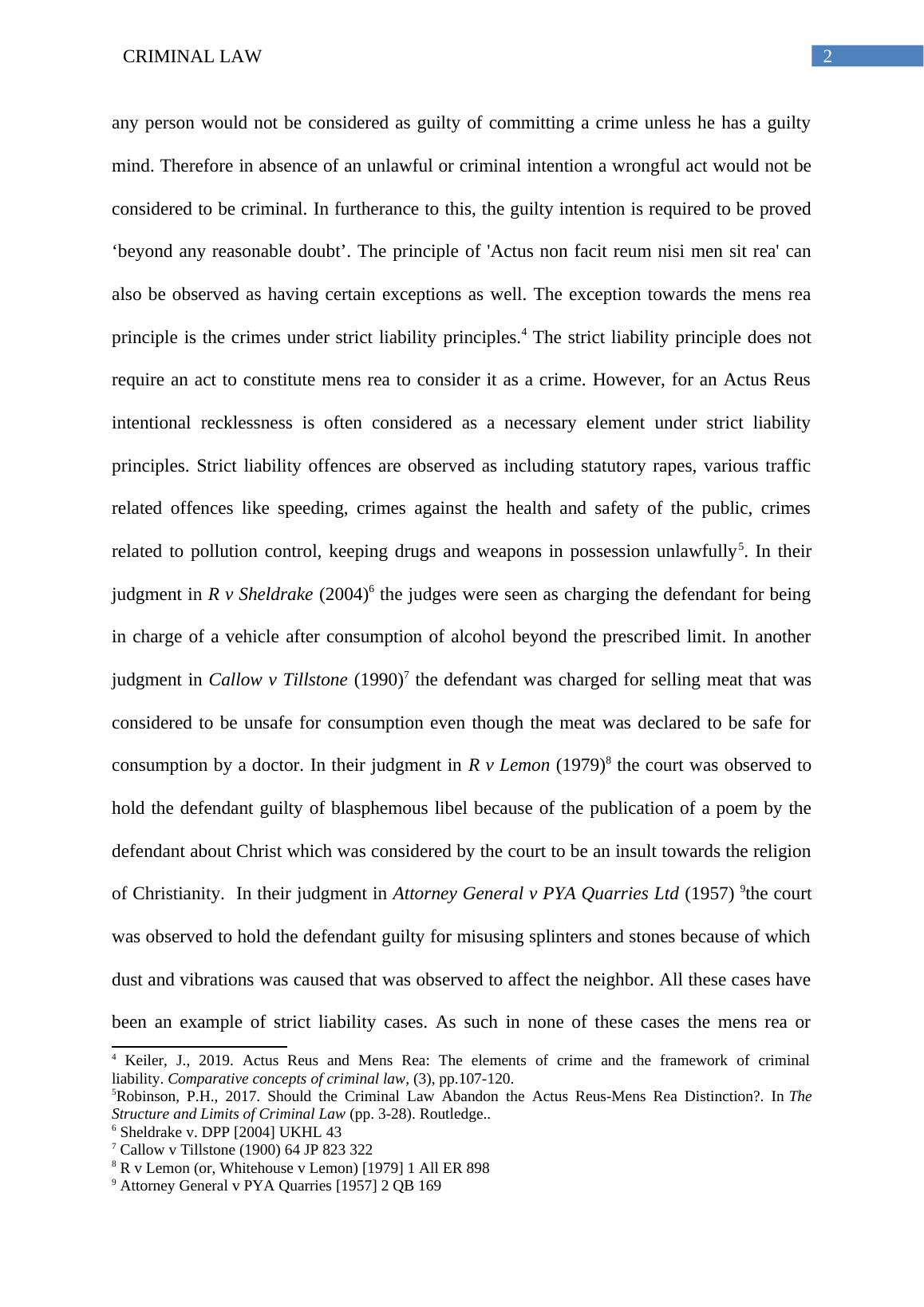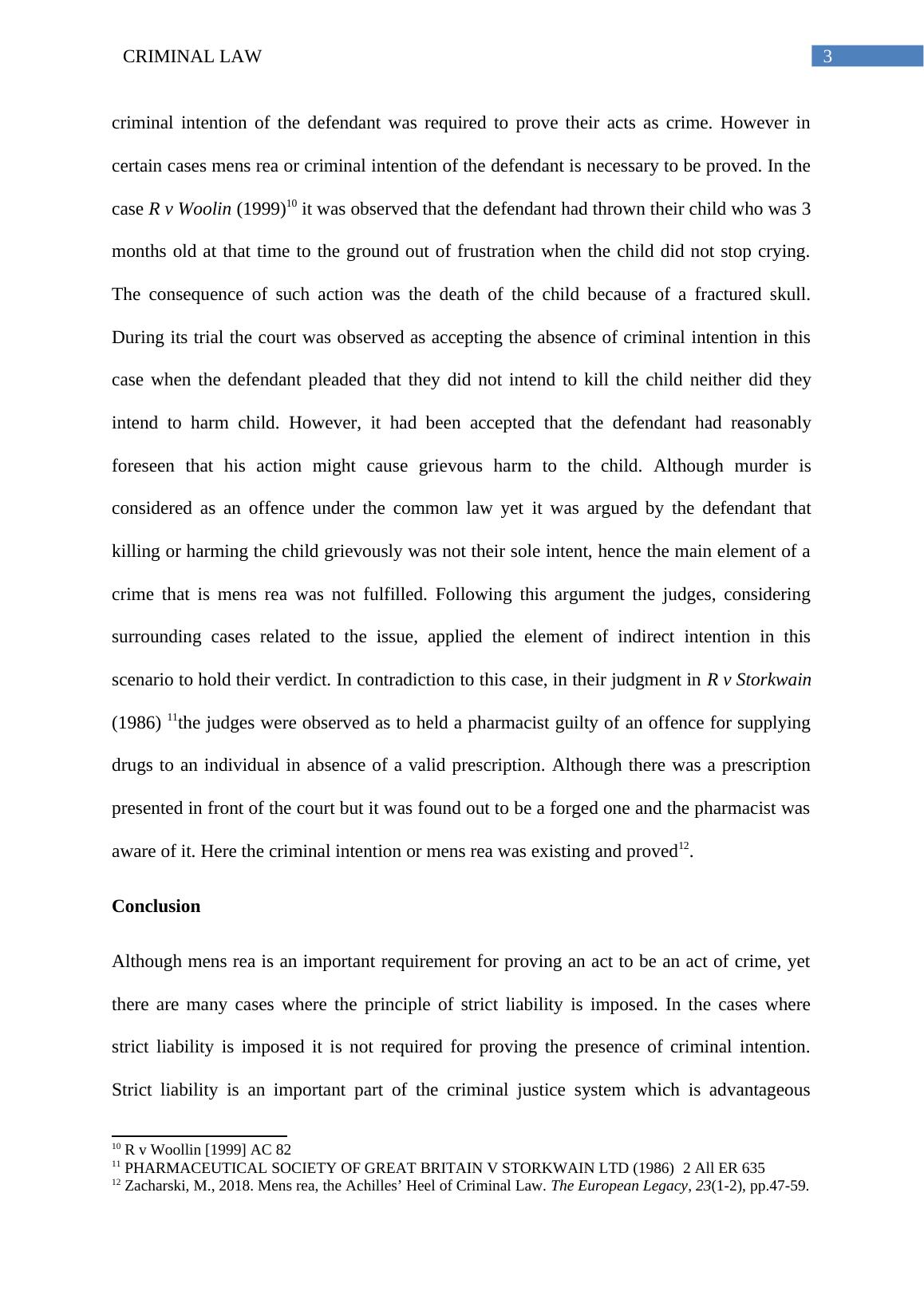Theories of Criminal Law -
17 Pages4620 Words17 Views
Added on 2022-08-21
Theories of Criminal Law -
Added on 2022-08-21
ShareRelated Documents
Running head: CRIMINAL LAW
CRIMINAL LAW
Name of Student
Name of University
Author Note
CRIMINAL LAW
Name of Student
Name of University
Author Note

CRIMINAL LAW1
Task 1 :
“Actus non facit reum, nisi mens sit rea” – An act does not make a person guilty
of a crime unless the mind is also guilty.
Does this principle always apply? Discuss the exception to this as well as
discussing the general principle.
Answer :
Introduction
A criminal is an individual who commits a crime. For an act to be considered as a
crime two separate elements are required to be present.1 The first element is Actus Reus and
the second element is mens rea2. The Latin term ‘Actus Reus’ means the action that has been
conducted and the term ‘Mens Rea’ refers to the mental state of the person while committing
an act. In other words, mens rea can be described as the guilty state of mind and Actus Reus
is the act of crime of itself which is considered as having negative effect on the society even
if the offense has been committed on an individual person.3 If a person commits an action or
omits an action against another individual or property that is considered as unlawful and is
punishable by law, it is defined as crime.
Actus non facit reum, nisi mens sit rea
‘Actus non facit reum, nisi mens sit rea’ can be defined as the common law maxim stating
that for an act to be wrong it should be done with a wrongful intent. As per the Latin term
1 Turvey, B.E., 2014. Criminal profiling. The Encyclopedia of Clinical Psychology, pp.1-6.
2 Bartol, A.M. and Bartol, C.R., 2014. Criminal behavior: A psychological approach. Boston: Pearson, c2014.
xxiii, 644 pages: illustrations; 24 cm..
3 Hasitha, S. and Jain, A., 2019. Actus reus and mens rea.
Task 1 :
“Actus non facit reum, nisi mens sit rea” – An act does not make a person guilty
of a crime unless the mind is also guilty.
Does this principle always apply? Discuss the exception to this as well as
discussing the general principle.
Answer :
Introduction
A criminal is an individual who commits a crime. For an act to be considered as a
crime two separate elements are required to be present.1 The first element is Actus Reus and
the second element is mens rea2. The Latin term ‘Actus Reus’ means the action that has been
conducted and the term ‘Mens Rea’ refers to the mental state of the person while committing
an act. In other words, mens rea can be described as the guilty state of mind and Actus Reus
is the act of crime of itself which is considered as having negative effect on the society even
if the offense has been committed on an individual person.3 If a person commits an action or
omits an action against another individual or property that is considered as unlawful and is
punishable by law, it is defined as crime.
Actus non facit reum, nisi mens sit rea
‘Actus non facit reum, nisi mens sit rea’ can be defined as the common law maxim stating
that for an act to be wrong it should be done with a wrongful intent. As per the Latin term
1 Turvey, B.E., 2014. Criminal profiling. The Encyclopedia of Clinical Psychology, pp.1-6.
2 Bartol, A.M. and Bartol, C.R., 2014. Criminal behavior: A psychological approach. Boston: Pearson, c2014.
xxiii, 644 pages: illustrations; 24 cm..
3 Hasitha, S. and Jain, A., 2019. Actus reus and mens rea.

CRIMINAL LAW2
any person would not be considered as guilty of committing a crime unless he has a guilty
mind. Therefore in absence of an unlawful or criminal intention a wrongful act would not be
considered to be criminal. In furtherance to this, the guilty intention is required to be proved
‘beyond any reasonable doubt’. The principle of 'Actus non facit reum nisi men sit rea' can
also be observed as having certain exceptions as well. The exception towards the mens rea
principle is the crimes under strict liability principles.4 The strict liability principle does not
require an act to constitute mens rea to consider it as a crime. However, for an Actus Reus
intentional recklessness is often considered as a necessary element under strict liability
principles. Strict liability offences are observed as including statutory rapes, various traffic
related offences like speeding, crimes against the health and safety of the public, crimes
related to pollution control, keeping drugs and weapons in possession unlawfully5. In their
judgment in R v Sheldrake (2004)6 the judges were seen as charging the defendant for being
in charge of a vehicle after consumption of alcohol beyond the prescribed limit. In another
judgment in Callow v Tillstone (1990)7 the defendant was charged for selling meat that was
considered to be unsafe for consumption even though the meat was declared to be safe for
consumption by a doctor. In their judgment in R v Lemon (1979)8 the court was observed to
hold the defendant guilty of blasphemous libel because of the publication of a poem by the
defendant about Christ which was considered by the court to be an insult towards the religion
of Christianity. In their judgment in Attorney General v PYA Quarries Ltd (1957) 9the court
was observed to hold the defendant guilty for misusing splinters and stones because of which
dust and vibrations was caused that was observed to affect the neighbor. All these cases have
been an example of strict liability cases. As such in none of these cases the mens rea or
4 Keiler, J., 2019. Actus Reus and Mens Rea: The elements of crime and the framework of criminal
liability. Comparative concepts of criminal law, (3), pp.107-120.
5Robinson, P.H., 2017. Should the Criminal Law Abandon the Actus Reus-Mens Rea Distinction?. In The
Structure and Limits of Criminal Law (pp. 3-28). Routledge..
6 Sheldrake v. DPP [2004] UKHL 43
7 Callow v Tillstone (1900) 64 JP 823 322
8 R v Lemon (or, Whitehouse v Lemon) [1979] 1 All ER 898
9 Attorney General v PYA Quarries [1957] 2 QB 169
any person would not be considered as guilty of committing a crime unless he has a guilty
mind. Therefore in absence of an unlawful or criminal intention a wrongful act would not be
considered to be criminal. In furtherance to this, the guilty intention is required to be proved
‘beyond any reasonable doubt’. The principle of 'Actus non facit reum nisi men sit rea' can
also be observed as having certain exceptions as well. The exception towards the mens rea
principle is the crimes under strict liability principles.4 The strict liability principle does not
require an act to constitute mens rea to consider it as a crime. However, for an Actus Reus
intentional recklessness is often considered as a necessary element under strict liability
principles. Strict liability offences are observed as including statutory rapes, various traffic
related offences like speeding, crimes against the health and safety of the public, crimes
related to pollution control, keeping drugs and weapons in possession unlawfully5. In their
judgment in R v Sheldrake (2004)6 the judges were seen as charging the defendant for being
in charge of a vehicle after consumption of alcohol beyond the prescribed limit. In another
judgment in Callow v Tillstone (1990)7 the defendant was charged for selling meat that was
considered to be unsafe for consumption even though the meat was declared to be safe for
consumption by a doctor. In their judgment in R v Lemon (1979)8 the court was observed to
hold the defendant guilty of blasphemous libel because of the publication of a poem by the
defendant about Christ which was considered by the court to be an insult towards the religion
of Christianity. In their judgment in Attorney General v PYA Quarries Ltd (1957) 9the court
was observed to hold the defendant guilty for misusing splinters and stones because of which
dust and vibrations was caused that was observed to affect the neighbor. All these cases have
been an example of strict liability cases. As such in none of these cases the mens rea or
4 Keiler, J., 2019. Actus Reus and Mens Rea: The elements of crime and the framework of criminal
liability. Comparative concepts of criminal law, (3), pp.107-120.
5Robinson, P.H., 2017. Should the Criminal Law Abandon the Actus Reus-Mens Rea Distinction?. In The
Structure and Limits of Criminal Law (pp. 3-28). Routledge..
6 Sheldrake v. DPP [2004] UKHL 43
7 Callow v Tillstone (1900) 64 JP 823 322
8 R v Lemon (or, Whitehouse v Lemon) [1979] 1 All ER 898
9 Attorney General v PYA Quarries [1957] 2 QB 169

CRIMINAL LAW3
criminal intention of the defendant was required to prove their acts as crime. However in
certain cases mens rea or criminal intention of the defendant is necessary to be proved. In the
case R v Woolin (1999)10 it was observed that the defendant had thrown their child who was 3
months old at that time to the ground out of frustration when the child did not stop crying.
The consequence of such action was the death of the child because of a fractured skull.
During its trial the court was observed as accepting the absence of criminal intention in this
case when the defendant pleaded that they did not intend to kill the child neither did they
intend to harm child. However, it had been accepted that the defendant had reasonably
foreseen that his action might cause grievous harm to the child. Although murder is
considered as an offence under the common law yet it was argued by the defendant that
killing or harming the child grievously was not their sole intent, hence the main element of a
crime that is mens rea was not fulfilled. Following this argument the judges, considering
surrounding cases related to the issue, applied the element of indirect intention in this
scenario to hold their verdict. In contradiction to this case, in their judgment in R v Storkwain
(1986) 11the judges were observed as to held a pharmacist guilty of an offence for supplying
drugs to an individual in absence of a valid prescription. Although there was a prescription
presented in front of the court but it was found out to be a forged one and the pharmacist was
aware of it. Here the criminal intention or mens rea was existing and proved12.
Conclusion
Although mens rea is an important requirement for proving an act to be an act of crime, yet
there are many cases where the principle of strict liability is imposed. In the cases where
strict liability is imposed it is not required for proving the presence of criminal intention.
Strict liability is an important part of the criminal justice system which is advantageous
10 R v Woollin [1999] AC 82
11 PHARMACEUTICAL SOCIETY OF GREAT BRITAIN V STORKWAIN LTD (1986) 2 All ER 635
12 Zacharski, M., 2018. Mens rea, the Achilles’ Heel of Criminal Law. The European Legacy, 23(1-2), pp.47-59.
criminal intention of the defendant was required to prove their acts as crime. However in
certain cases mens rea or criminal intention of the defendant is necessary to be proved. In the
case R v Woolin (1999)10 it was observed that the defendant had thrown their child who was 3
months old at that time to the ground out of frustration when the child did not stop crying.
The consequence of such action was the death of the child because of a fractured skull.
During its trial the court was observed as accepting the absence of criminal intention in this
case when the defendant pleaded that they did not intend to kill the child neither did they
intend to harm child. However, it had been accepted that the defendant had reasonably
foreseen that his action might cause grievous harm to the child. Although murder is
considered as an offence under the common law yet it was argued by the defendant that
killing or harming the child grievously was not their sole intent, hence the main element of a
crime that is mens rea was not fulfilled. Following this argument the judges, considering
surrounding cases related to the issue, applied the element of indirect intention in this
scenario to hold their verdict. In contradiction to this case, in their judgment in R v Storkwain
(1986) 11the judges were observed as to held a pharmacist guilty of an offence for supplying
drugs to an individual in absence of a valid prescription. Although there was a prescription
presented in front of the court but it was found out to be a forged one and the pharmacist was
aware of it. Here the criminal intention or mens rea was existing and proved12.
Conclusion
Although mens rea is an important requirement for proving an act to be an act of crime, yet
there are many cases where the principle of strict liability is imposed. In the cases where
strict liability is imposed it is not required for proving the presence of criminal intention.
Strict liability is an important part of the criminal justice system which is advantageous
10 R v Woollin [1999] AC 82
11 PHARMACEUTICAL SOCIETY OF GREAT BRITAIN V STORKWAIN LTD (1986) 2 All ER 635
12 Zacharski, M., 2018. Mens rea, the Achilles’ Heel of Criminal Law. The European Legacy, 23(1-2), pp.47-59.

End of preview
Want to access all the pages? Upload your documents or become a member.
Related Documents
Elements of A Crime Case Study 2022lg...
|3
|404
|26
Criminal Law Solved Assignmentlg...
|3
|1729
|69
CRIMINAL LAW. CRIMINAL LAW Name of the Student: Name oflg...
|12
|3333
|39
Assignment on Law - Problem scenariolg...
|9
|1510
|16
Essay on Criminal Lawlg...
|9
|2912
|265
Criminal Law Assignment - ACTUS REUSlg...
|10
|2912
|542
